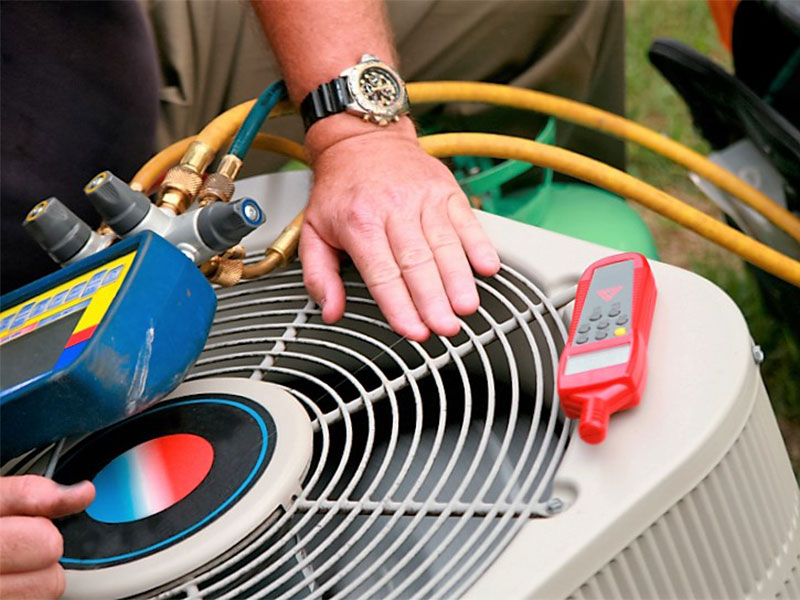
Optimizing Home Comfort: A Comprehensive Guide to Servicing Your HVAC System
Maintaining your HVAC (Heating, Ventilation, and Air Conditioning) system is essential for efficient operation, energy savings, and overall home comfort. In this guide, we’ll take you through the key steps of servicing your HVAC system to ensure it performs optimally throughout the year.
Understanding the Importance of HVAC Service
Regular HVAC service is crucial for several reasons. It improves energy efficiency, extends the lifespan of your system, enhances indoor air quality, and helps prevent costly repairs. A well-maintained HVAC system ensures consistent heating and cooling performance, providing comfort for you and your family.
Scheduling Regular Professional Inspections
Professional HVAC inspections are a cornerstone of effective maintenance. Schedule annual inspections with a licensed technician to evaluate your system’s components, identify potential issues, and ensure everything is in working order. Professional inspections catch problems early, preventing major breakdowns and prolonging the life of your HVAC unit.
Changing Air Filters for Improved Air Quality
One of the simplest yet most impactful maintenance tasks is regularly changing your air filters. Clogged filters hinder airflow, reduce efficiency, and compromise indoor air quality. Check your filters monthly and replace them every 1-3 months, depending on usage. This small effort goes a long way in preserving your HVAC system’s performance.
Cleaning and Clearing Vents and Ducts
Over time, vents and ducts accumulate dust, debris, and allergens, reducing system efficiency. Regularly clean and clear vents to ensure unobstructed airflow. Consider professional duct cleaning every few years to remove accumulated dirt. Clean ducts contribute to better indoor air quality and prevent strain on your HVAC system.
Inspecting and Cleaning the Condenser Unit
The condenser unit, typically located outside, is exposed to the elements and can accumulate dirt and debris. Regularly inspect and clean the condenser coils, fins, and surrounding area. Keep the unit clear of vegetation and debris to ensure optimal heat exchange and efficient cooling. This simple step helps your HVAC system work at its best.
Checking Refrigerant Levels and Leaks
Proper refrigerant levels are crucial for efficient cooling. Low levels can lead to decreased performance and potential damage to your system. Schedule professional checks to ensure the correct refrigerant levels and detect any leaks. Addressing refrigerant issues promptly maintains the cooling efficiency of your HVAC system.
Calibrating Thermostats for Accuracy
A thermostat that is not calibrated accurately can lead to uneven heating or cooling and higher energy bills. Periodically check and calibrate your thermostat to ensure it accurately reflects the desired temperature. Consider upgrading to a programmable thermostat for more precise control and energy savings.
Inspecting and Lubricating Moving Parts
Moving parts within your HVAC system, such as fan blades and motors, can wear down over time. Regularly inspect and lubricate these parts to reduce friction and prevent excessive wear. Lubrication ensures smooth operation and helps avoid unexpected breakdowns.
Checking Electrical Components
Faulty electrical components can lead to system malfunctions and safety hazards. During HVAC service, technicians should inspect all electrical connections, controls, and components. Tighten loose connections, replace damaged wiring, and ensure the safe and efficient operation of your HVAC system.
Investing in Smart HVAC Technologies
Consider integrating smart technologies into your HVAC system for enhanced control and efficiency. Smart thermostats, zoning systems, and remote monitoring tools provide real-time insights and allow you to optimize your system’s performance. Explore innovative solutions at thietbidinhvithongminh.com to enhance your HVAC experience.
Conclusion: Prioritizing HVAC System Service for Home Comfort
Servicing your HVAC system is a proactive approach to ensure efficient heating and cooling, energy savings, and a comfortable indoor environment. Regular professional inspections, DIY maintenance tasks, and the integration of smart technologies contribute to the overall health and longevity of your HVAC system. Visit thietbidinhvithongminh.com for additional insights on optimizing your home comfort.
A well-maintained HVAC system is an investment in your home’s comfort and energy efficiency. By prioritizing regular service, you not only enjoy consistent heating and cooling but also contribute to lower energy bills and a healthier indoor environment for you and your family.
